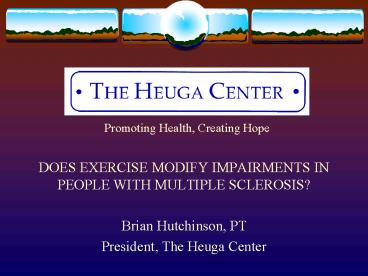Promoting Health, Creating Hope - PowerPoint PPT Presentation
1 / 18
Title:
Promoting Health, Creating Hope
Description:
Improvements in balance with up to six months after physiotherapy treatment (DeSouza, 1984) ... Different Approach to Physiotherapy for Multiple Sclerosis ... – PowerPoint PPT presentation
Number of Views:82
Avg rating:3.0/5.0
Title: Promoting Health, Creating Hope
1
Promoting Health, Creating Hope
- DOES EXERCISE MODIFY IMPAIRMENTS IN PEOPLE WITH
MULTIPLE SCLEROSIS? - Brian Hutchinson, PT
- President, The Heuga Center
2
History of Exercise/Rehab in MS Management
- Previous Perspective
- Restrict all activities/ Bed rest
- Normal physical and psychological stress will
enhance disease activity - Current Perspective
- Increased activity/rehabilitation concepts, in
part, responsible for an almost normal life
expectancy for the average person with MS
3
Result of Decreased Activity
INACTIVITY
DECONDITIONING
PHYSICAL IMPAIRMENT
PSYCHOLOGICAL DISTURBANCES
4
Common Impairments in People with Multiple
Sclerosis
- Decreases in
- ROM
- Strength/Weakness
- Sensation
- Balance/Coordination/
- Tremor
- Also
- Fatigue
- Spasticity
- Bowel/Bladder Dysfunction
- Visual Disturbances (Double or blurred vision)
5
Impairments Modifiable by Exercise
- ROM/Spasticity
- Strength/Weakness
- Balance/Coordination
- Fatigue
- Bowel/Bladder
6
Range of Motion
- Primarily empirical data
- Decrease in spasticity when stretching added to
medication (Brar, et.al, 1991)
7
Strength/Weakness
- Improvements in muscle strength and endurance
with water exercise program (Gehlsen, et.al.,
1984) - Differences in absolute strength measures in
those with MS (Chen, 1987 Ponichtera, 1992) - Increased strength with lower body,
low-resistance training program (Svensson,
et.al., 1994) - Increases in upper and lower extremity strength
with aerobic exercise program (Petajan, et.al.,
1996)
8
Balance and Coordination
- Most studies for elderly and vestibular
populations (Chan, et. al. 1994) - Improvements in balance with up to six months
after physiotherapy treatment (DeSouza, 1984) - Improvements in balance and balance confidence
using ATM group class (Stephens, et.al., 2001)
9
Fatigue
- Differences in people with MS as it relates to
aerobic capacity/VO2 max (Schapiro, et.al., 1987
Ponichtera-Mulcare, et.al., 1993) - Improvements in fatigue with 4-6 week training
program (Svensson, et.al., 1994) - Improvements in VO2 max with aerobic training
program (Petajan, et.al., 1996)
10
Bowel and Bladder
- Improvements in bowel and bladder function as
measured on Expanded Disability Status Scale
EDSS (Petajan, et.al.)
11
Impairment (EDSS)
- No change in EDSS with rehabilitation program at
discharge or 3 months post rehab (Kidd, 1997) - No change in EDSS following inpatient rehab
(Freeman, et.al., 1997 Solari, et.al., 1999) - Decline in neurologic status as measured by EDSS
over long term (Freeman, et.al., 1999)
12
Disability/Activity Limitation (FIM)
- Significant improvement in function (FIM) at
discharge and 3 months post rehab (Kidd, 1997) - Reduced disability (except ambulation) up to 6
months (Freeman, et.al., 1997 1999) - Improvement for up to 9 weeks in FIM scores
(Solari, et.al., 1999) - 6 month aerobic training program had minimal
effect on gait abnormalities (Rodgers, et.al.,
1999) - The Potential of Exercise to Improve ADLs
(Lexell, 2000) - Improvements in mobility (RMI) following 8 weeks
of physiotherapy (home or outpatient) (Wiles,
2001)
13
Handicap
- Trend toward improvement in handicap (ESS) (Kidd,
1997) - Reduction in handicap (LHS) following IP rehab
(Freeman, et.al., 1997) - Reduction in handicap (LHS) up to 6 months
(Freeman, et.al., 1999)
14
The most important factor for development has
been the realization that normal physical and
psychological stress do not activate the disease
process and that persons with MS must be, within
their disease-inflicted limitations, as active as
possible in all ways of life. Jurgen Mertin,
MD Annals of Neurology, 1994
Rehabilitation is clearly the only practical
means of significantly improving function in MS
patients George Kraft, MD The Lancet,
December 11, 1999
15
Summary
- Physical Activity/Exercise can improve
impairment, disability and handicap - Improvement in quality of life
16
References
- Brar, et.al., Evaluation of Treatment Protocols
on Minimal to Moderate Spasticity in Multiple
Sclerosis. Arch Phys Med Rehabil, 1991 72
186-189 - Chan, et.al, Balance and Spasticity What We
Know and What We Believe. J Neurol Rehabil, 1994
8 119-130 - Chen, et.al, Force Time Measurements of Knee
Muscle Fundtions of Subjects with Multiple
Sclerosis. Phys. Ther, 1987 67 934-940 - DeSouza, A Different Approach to Physiotherapy
for Multiple Sclerosis Patients. Physiotherapy,
1984 70 429-432. - Freeman, et.al., The Impact of Inpatient
Rehabilitation on Progressive Multiple Sclerosis.
Ann Neurol, 1996 39 432-441 - Freeman, et.al., Inpatient rehabilitation in
multiple sclerosis. Neurol, 1999 52 50-56 - Gehlsen, et.al, Effects of an Aquatic Fitness
Program on the Muscular Strength and Endurance of
Patients with Multiple Sclerosis. Phys Ther,
1984 64 653-657 - Kidd, et.al., The benefit of inpatient
neurorehabilitation in multiple sclerosis. Clin
Rehabil, 1995 9 198-203.
17
References
- Lexell, Muscle Structure and Function in Chronic
Neurological Disorders The Potential of Exercise
to Improve Activities of Daily Living. Ex Sport
Science Rev, 2000 28 80-84 - National Multiple Sclerosis Society website
statistics - Petajan, et.al., Impact of Aerobic Training on
Fitness and Quality of Life in Multiple
Sclerosis. Ann Neurol, 1996 39 432-441 - Ponichtera-Mulcare, Exercise and multiple
sclerosis. Med Sci Sports Exerc, 1993 25
451-465 - Rodgers, et.al., Gait characteristics of
individiuals with multiple sclerosis before and
after a 6-month aerobic training program. J
Rehabil Res Dev, 1999 36 183-188 - Schapiro, et.al., Role of Cardiovascular Fitness
in Multiple Sclerosis A Pilot Study. J Neuro
Rehab, 1988 2 43-49 - Stephens, et.al., Use of Awareness Through
Movement Improves Balance and Balance Confidence
in People with Multiple Sclerosis A Randomized
Controlled Study. Neuro Rep, 2001 25 39-49
18
References
- Solari, et.al., Physical rehabilitation has a
positive effect on disability in multiple
sclerosis patients. Neurol, 1999 52 57-62 - Svensson, et.al., Endurance Training in Patients
with Multiple Sclerosis Five Case Studies. Phys
Ther, 1994 74 1017-1026 - Wiles, et.al., Physiotherapy Improves Mobility,
Subjective Well-Being in Patients with MS. J
Neurol Neurosurg Psychiatry 2001 70 174-179 - World Health Organization 2000, ICIDH-2,
International Classification of functioning,
disability and health World Health Organization,
Geneva































